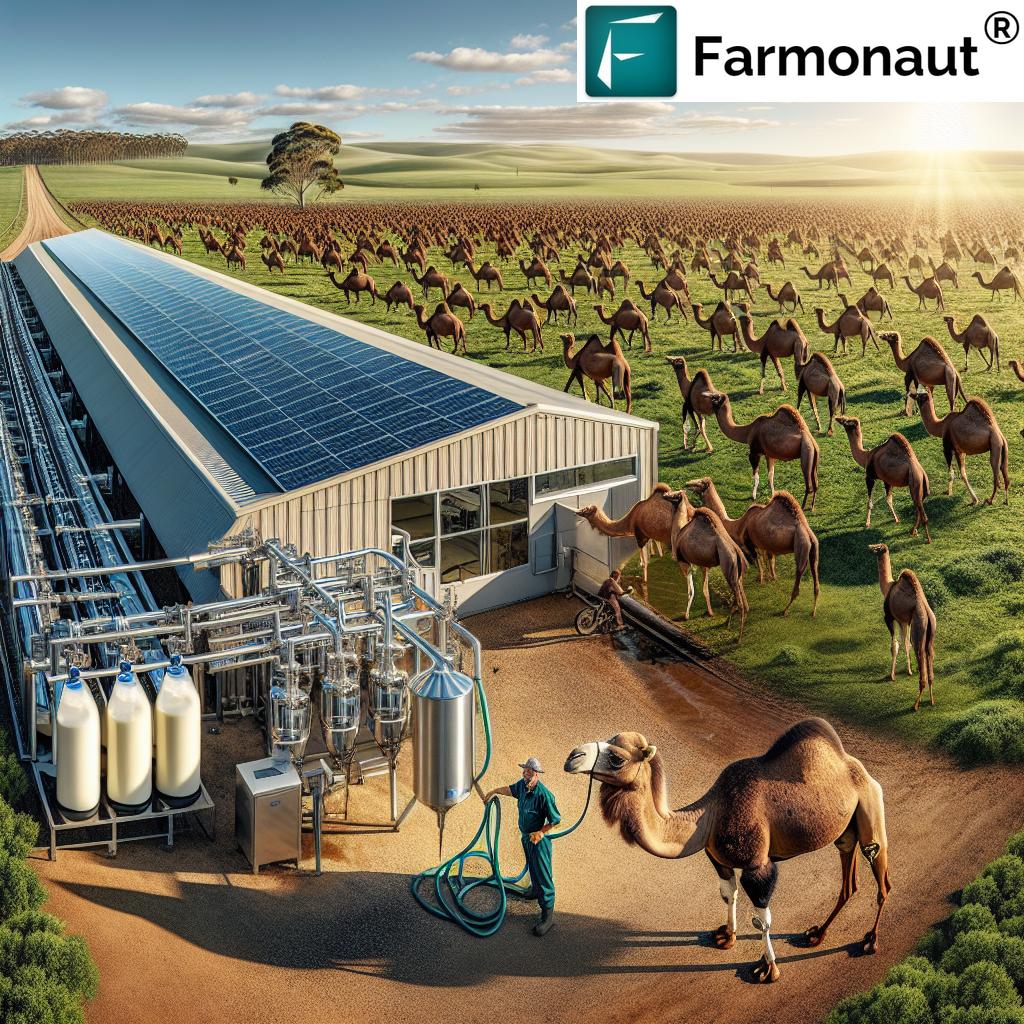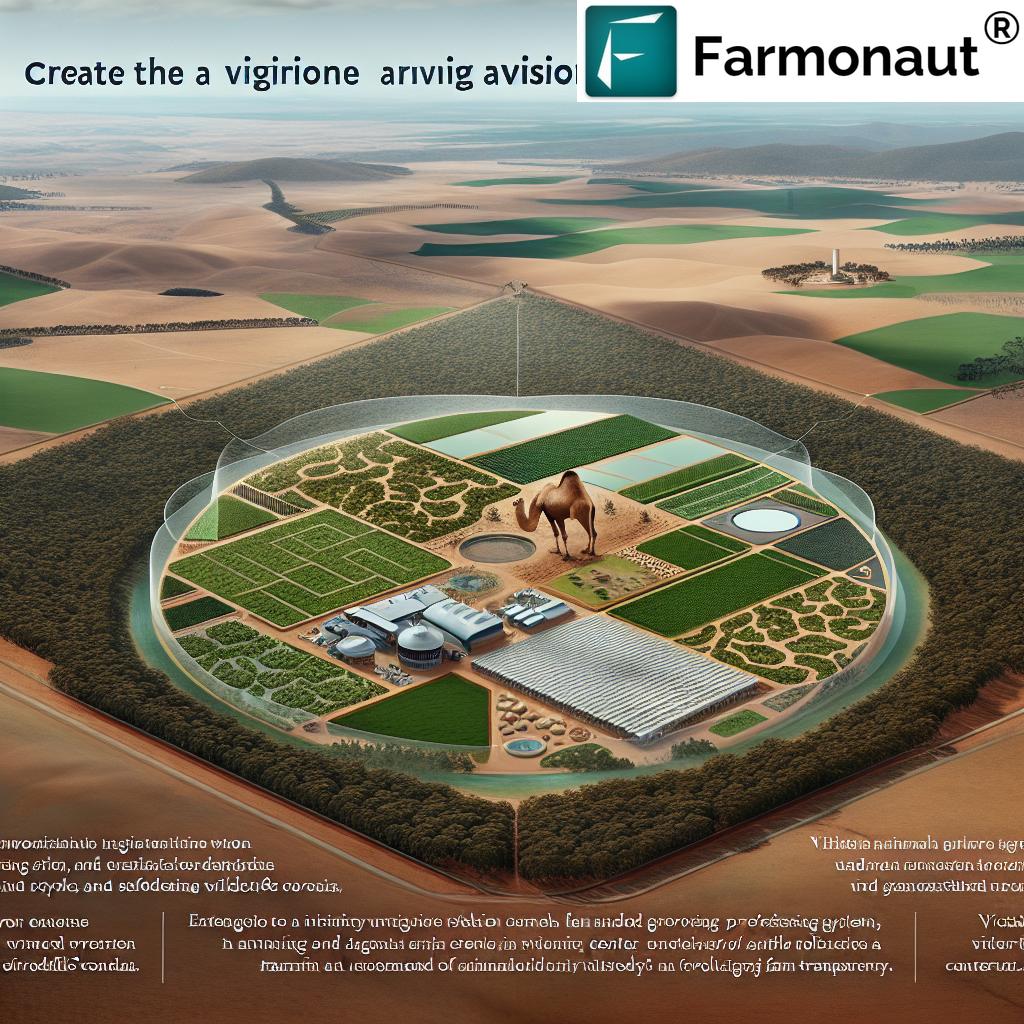Unveiling the Truth: Sustainable Dairy Farming Alternatives in Victoria’s Camel Industry 2024
“In 2024, Victoria’s camel dairy industry is estimated to produce over 50,000 liters of milk annually.”
Welcome to our comprehensive exploration of sustainable dairy farming alternatives, with a special focus on Victoria’s burgeoning camel industry in 2024. As we delve into this fascinating world, we’ll uncover the innovative practices, challenges, and opportunities that are shaping the future of dairy production in Australia.
The Rise of Alternative Milk Production
In recent years, we’ve witnessed a significant shift in the dairy industry, with consumers increasingly seeking out alternatives to traditional cow’s milk. This trend has paved the way for innovative approaches to dairy farming, and one of the most intriguing developments has been the emergence of camel dairy farms in Victoria.
As agricultural experts, we at Farmonaut have been closely monitoring these changes, recognizing the potential for sustainable dairy farming practices to revolutionize the industry. Our satellite-based farm management solutions are designed to support farmers in their transition to more sustainable and efficient methods, regardless of the type of livestock they’re working with.

The Australian Camel Dairy Industry: A Growing Niche
The camel dairy sector in Australia, particularly in Victoria, has been gaining traction as a viable and sustainable alternative to traditional dairy farming. This niche market is not only providing consumers with unique dairy products but also addressing some of the environmental concerns associated with conventional dairy practices.
- Estimated production figures
- Industry value and potential
- Challenges and opportunities
To better understand the current state of the industry, let’s take a look at some key figures:
| Farming Practice | Traditional Dairy (Cows) | Camel Dairy |
|---|---|---|
| Estimated milk production (liters/year) | 6,000,000,000 | 50,000 |
| Water consumption (liters/liter of milk) | 1,020 | 680 |
| Land use efficiency (hectares/animal) | 0.8 | 2.5 |
| Greenhouse gas emissions (CO2 equivalent/liter of milk) | 2.4 | 1.8 |
| Animal welfare practices (rating scale 1-10) | 7 | 8 |
| Estimated market value (AUD/liter) | 1.50 | 25.00 |
| Sustainability score (1-10 scale) | 6 | 8 |
As we can see from the table, while camel dairy production is still relatively small compared to traditional dairy, it offers significant advantages in terms of sustainability and environmental impact. This is where technologies like those offered by Farmonaut can play a crucial role in optimizing these emerging farming practices.
Ethical Animal Husbandry in Camel Dairy Farms
One of the most compelling aspects of the camel dairy industry is its focus on ethical animal husbandry. Many camel dairy farms in Victoria are positioning themselves as sanctuaries, prioritizing the welfare of their animals alongside milk production.
- Spacious living conditions
- Natural grazing practices
- Low-stress milking techniques
At Farmonaut, we understand the importance of animal welfare in sustainable farming practices. Our satellite-based monitoring systems can help farmers track herd movements and health, ensuring that camels are given the space and care they need to thrive.
Farm Transparency Initiatives
“Australian camel dairy farms have seen a 30% increase in virtual tour participation since implementing transparency initiatives.”
Transparency has become a cornerstone of sustainable dairy farming, and camel dairy farms in Victoria are leading the way. Many farms are now offering virtual tours, allowing consumers to see firsthand how the animals are treated and how the milk is produced.
- Virtual farm tours
- Open-door policies
- Detailed product labeling
Farmonaut’s technology can enhance these transparency initiatives by providing real-time data on farm conditions, which can be shared with consumers. Our API allows for seamless integration of this data into farm websites and virtual tour platforms.
Innovative Dairy Solutions
The camel dairy industry is at the forefront of innovative dairy solutions, implementing cutting-edge technologies to improve efficiency and sustainability. Some of these innovations include:
- Advanced milking systems
- Precision feeding techniques
- Waste management solutions
Farmonaut’s satellite-based crop health monitoring and AI advisory systems can play a crucial role in optimizing feed production for camel dairy farms, ensuring that the animals receive the best possible nutrition while minimizing environmental impact.

Dairy Farm Technologies
The integration of advanced technologies is transforming the camel dairy industry. From wearable devices for health monitoring to sophisticated data analytics for production optimization, these technologies are making camel dairy farming more efficient and sustainable.
- IoT sensors for health monitoring
- AI-powered predictive analytics
- Blockchain for supply chain transparency
Farmonaut’s platform is designed to seamlessly integrate with these technologies, providing farmers with a comprehensive suite of tools for managing their camel dairy operations. Our API Developer Docs offer guidance on how to incorporate our satellite data into existing farm management systems.
Animal-Friendly Farming Methods
Camel dairy farms in Victoria are pioneering animal-friendly farming methods that prioritize the well-being of their herds. These methods include:
- Free-range grazing systems
- Stress-free milking procedures
- Enrichment activities for mental stimulation
By implementing these methods, camel dairy farms are not only improving animal welfare but also producing higher quality milk. Farmonaut’s satellite imagery can help farmers optimize their grazing systems by providing detailed vegetation health data, ensuring that camels always have access to nutritious pastures.
Agricultural Sustainability in Camel Dairy Farming
Sustainability is at the heart of the camel dairy industry in Victoria. Farms are implementing a range of practices to reduce their environmental footprint and promote long-term ecological balance:
- Water conservation techniques
- Renewable energy integration
- Biodiversity preservation efforts
Farmonaut’s carbon footprinting tools can assist camel dairy farms in tracking and reducing their emissions, contributing to the industry’s overall sustainability goals. Our platform provides real-time data on resource usage, helping farmers make informed decisions about their environmental impact.
The Future of Dairy: Camel Milk and Beyond
As we look to the future of dairy farming in Victoria and beyond, camel milk represents just one of many innovative alternatives that are shaping the industry. The lessons learned from camel dairy farming can be applied to other alternative milk sources, creating a more diverse and sustainable dairy landscape.
- Potential for other alternative milk sources
- Integration of sustainable practices across the dairy industry
- Consumer education and market growth
Farmonaut is committed to supporting the evolution of the dairy industry, providing cutting-edge technology solutions that can be adapted to various types of dairy farming. Our platform is designed to grow and evolve alongside the industry, ensuring that farmers always have access to the most advanced agricultural tools.
Challenges and Opportunities in the Camel Dairy Industry
While the camel dairy industry in Victoria offers exciting possibilities, it also faces unique challenges:
- Limited consumer awareness
- Regulatory hurdles
- Scale and distribution issues
However, these challenges also present opportunities for innovation and growth. Farmonaut’s technology can help address some of these issues by improving efficiency and transparency in camel dairy operations, making it easier for farms to scale up and meet growing demand.
The Role of Technology in Sustainable Dairy Farming
Technology plays a crucial role in advancing sustainable dairy farming practices, whether in traditional cow dairy or emerging alternatives like camel dairy. Farmonaut’s suite of tools exemplifies how technology can drive sustainability in agriculture:
- Satellite-based crop health monitoring for optimized feed production
- AI-driven advisory systems for precision farming
- Blockchain-based traceability for supply chain transparency
- Carbon footprint tracking for environmental impact reduction
By leveraging these technologies, camel dairy farms in Victoria can improve their efficiency, reduce their environmental impact, and meet the growing consumer demand for sustainable, ethically-produced dairy products.
Consumer Perspectives on Camel Milk
As the camel dairy industry grows, understanding consumer perspectives is crucial. Many consumers are drawn to camel milk for its potential health benefits and unique flavor profile. However, there’s still a need for education and awareness:
- Nutritional benefits of camel milk
- Taste comparisons with traditional dairy
- Cultural significance and historical use
Farmonaut’s data can help camel dairy farms tailor their production to meet consumer preferences, ensuring a steady supply of high-quality milk that meets market demands.
Government Support and Regulation
The growth of the camel dairy industry in Victoria has caught the attention of government bodies. As the sector expands, we’re seeing increased support and regulation aimed at ensuring food safety and promoting sustainable practices:
- Development of camel dairy-specific regulations
- Grants and subsidies for sustainable farming initiatives
- Research funding for camel dairy innovation
Farmonaut’s technology can assist farms in meeting regulatory requirements by providing accurate, real-time data on farm operations and environmental impact.
Economic Impact of Camel Dairy Farming
The camel dairy industry is having a significant economic impact on Victoria’s agricultural sector:
- Job creation in rural areas
- Diversification of agricultural exports
- Development of value-added camel milk products
By improving efficiency and productivity, Farmonaut’s tools can help camel dairy farms maximize their economic potential while maintaining sustainable practices.
FAQs About Camel Dairy Farming in Victoria
- Q: Is camel milk safe to drink?
A: Yes, camel milk is safe to drink when produced under proper hygienic conditions. It’s regulated like other dairy products in Australia. - Q: How does camel milk taste compared to cow’s milk?
A: Camel milk has a slightly saltier and sweeter taste than cow’s milk, with a smooth, creamy texture. - Q: Are camels native to Australia?
A: No, camels were introduced to Australia in the 19th century. The Australian camel population is now one of the largest wild herds in the world. - Q: How sustainable is camel dairy farming?
A: Camel dairy farming can be more sustainable than traditional dairy in terms of water usage and greenhouse gas emissions, but it depends on specific farming practices. - Q: Can people with lactose intolerance drink camel milk?
A: Many people with lactose intolerance find camel milk easier to digest, as it contains less lactose than cow’s milk. However, individual reactions may vary.
Conclusion: The Future of Sustainable Dairy Farming in Victoria
As we’ve explored throughout this blog post, the camel dairy industry in Victoria represents an exciting frontier in sustainable dairy farming. With its focus on animal welfare, environmental sustainability, and innovative technologies, camel dairy farming offers a compelling alternative to traditional dairy practices.
At Farmonaut, we’re excited to be part of this agricultural revolution. Our satellite-based farm management solutions are designed to support farmers in their transition to more sustainable and efficient methods, regardless of the type of livestock they’re working with. By leveraging technology to optimize farm operations, reduce environmental impact, and improve transparency, we can help create a more sustainable future for dairy farming in Victoria and beyond.
As consumers become more conscious of their food choices and their impact on the planet, industries like camel dairy are poised to play an increasingly important role in our food systems. By embracing innovation, prioritizing sustainability, and maintaining a commitment to ethical practices, the camel dairy industry in Victoria is setting a new standard for sustainable agriculture.
We invite you to explore how Farmonaut can support your farming operations, whether you’re involved in camel dairy or any other type of agriculture. Our platform is designed to grow and adapt alongside the ever-evolving agricultural landscape, providing you with the tools you need to thrive in a changing world.
Explore Farmonaut’s Solutions:
Together, we can build a more sustainable, ethical, and innovative future for dairy farming in Victoria and beyond.






